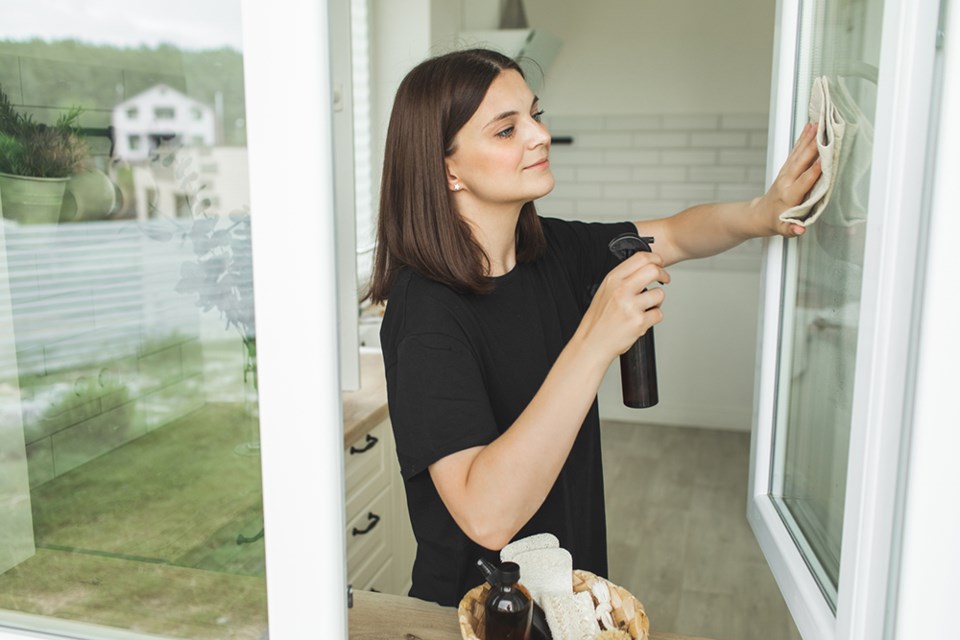Have you ever wondered whether your household cleaning products are doing you and yours more harm than good? If so, you are not alone, or without good reason to take a closer look at what you are spraying, scouring, washing and sanitizing your home with.
The list of questionable ingredients is long. It includes phthalates – a hormone disruptor in many air “fresheners”; perchlorethylene – a neurotoxin found in dry-cleaning solutions; triclosan – an aggressive antibacterial that can create drug-resistant bacteria that is found in most liquid detergents; quaternary ammonium compounds – also capable of creating resistant bacteria and is in fabric softeners; ammonia – an irritant that can cause toxic gases if mixed with bleach; and chlorine – a possible thyroid disruptor often present in household cleaners.
Fortunately, there are some alternative cleaners you likely have around your home that can be used safely and effectively.
- Baking soda/powder can clean, deodorize and scour surfaces.
- Lemon is one of the strongest grease cutters around and its acidity can kill many household bacteria, not to mention its pleasant odour masking capacity.
- Rosemary is naturally antiviral, anti-fungal, antiseptic and antibacterial.
- White vinegar cuts grease and is able to remove mildew, odours and is a natural fabric softener.
- Cornstarch can be used to buff surfaces and deodorize.
- Citrus solvents can clean paint brushes, oil, grease and even some stains.
- Borax (sodium borate) is able to clean, deodorize, disinfect, soften water, and clean painted walls and floors.
- Newspaper is often more effective than a cloth at cleaning glass.
- Toothpaste is great at polishing silver.
- Tea tree oil or Thieves oil can be added to cleaning recipes as powerful germ killers.
- Lavender or other fragrant essential oils are a great addition to home made cleaners.
By raiding your cupboards and looking under your sink, you may find all the ingredients you need to allow you to ditch chemically-laden cleaners. You’ll find the learning curve is short, as there are usually only a few ingredients per natural cleaning recipe and there are many to choose from online.
Once you get in the habit, you will likely see big cost savings for making products at home. Your recycling box will be less cluttered, too, as the plastic-heavy packaging of many cleaners can be replaced with glass jars, or reusable spray containers.
Start this week by replacing one of your household cleaners with an earth-friendly alternative you make at home.
Here are a few recipes to get you started:
1. All purpose cleaner – one part white vinegar, one part water, lemon rind, rosemary sprigs. Mix and store in a spray bottle for use when needed.
2. Kitchen deodorizer – 4 tablespoons baking powder, 1 quart warm water. Mix and then scour surfaces.
3. Glass cleaner – 2 cups water, 1/2 cup white vinegar, 1/4 cup rubbing alcohol (70 per cent), 1-2 drops of your favourite essential oil for scent. Mix, and then spray on glass. Dry with newspaper, which won’t leave lint on the surface.
4. Brass cleaner – dampen sponge with lemon juice or white vinegar and then sprinkle on salt. Rub on the surface. Rinse with water. Dry with a cloth. Polish.
5. Drain declogger – 1/2 cup baking soda, 1 cup white vinegar, 16 cups (1 gallon) boiling water. Pour baking soda down the drain as far as you can. Pour in half the vinegar. Cover drain until “fizzing” stops. Pour remaining vinegar down the drain. Cover drain again until fizzing stops. Pour boiling water down. Repeat if needed.
Spring cleaning doesn’t require dirtying the earth!
Let’s Talk Trash is contracted by qathet Regional District to deliver its waste reduction education program. For more information, email [email protected] or go to LetsTalkTrash.ca.



